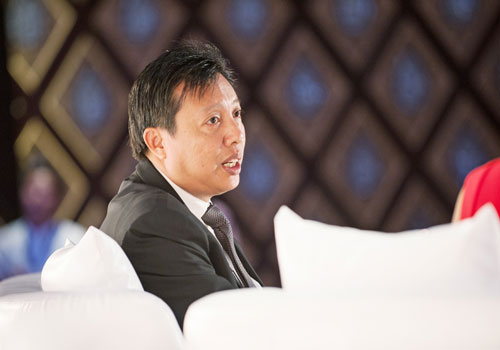Myanmar: Clearer policies and liberalisation needed: Bloomberg summit
There is no country other than Myanmar where foreign investors can come and invest, where the democratic transition is relatively smooth and where an economy opens up to the world at the same time, said one of the local tycoons at the Bloomberg Invest Myanmar summit held on March 9 in Yangon.

U Zaw Zaw, chair of Max Myanmar, at the Bloomberg summit. Aung Khant / The Myanmar Times
“Don’t think too much [Don’t take too much time of thinking how to overcome hurdles to invest in Myanmar] … This is the final frontier market. [Myanmar] is the easiest country [to do business] with enormous opportunities, [unlike] other countries with mature markets like Singapore or Thailand where investors cannot penetrate,” said Dr Sai Sam Htun, chair of beverage manufacturer Asahi Loi Hein.
Dr Sai said that there are enormous challenges to overcome – a power supply shortage, a high-cost business, and a lack of both clear policies and infrastructure – but that does not mean Myanmar is a country in which one should be hesitant to invest.
“Challenges can be solved through collaboration with local companies. The government is inviting foreign investors and trying to open its economic doors to the world more so than in the past,” he added.
At the same time, the government needs to implement clear economic policies and strategies if the country is going to gain the trust of foreign and local investors, according to Dr Sai.
“We want to know the exact policies and strategies that the government is implementing. Looking back at the past year under the new government, we don’t see this happening in terms of politics and the economy. Building government capacity … can help gain the trust of international investors,” he said.
When the government is trying to achieve peace and reconciliation, an economy-driving implementation has to go hand in hand; without economic developmen, Myanmar cannot even compete on the regional level, Dr Sai insisted during the sideline interview with the media at the summit.
“The government needs to look at investor-friendly policies to attract foreign investments,” said U Zaw Zaw, chair of Max Myanmar, during a panel discussion.
“Infrastructure, clarity and business credibility are main policies that the government should prioritise,” he said.
According to U Zaw Zaw, local and international investors should also try to invest in infrastructure like building highways and expanding the power supply, in terms of manufacturing, transmission and distribution. Transitioning to a digital platform – not just in the banking sector but also in the government system – is very complicated.

Peter Beynon, chair of Myanmar and Cambodia at Jardine Matheson, speaks during a panel discussion. Aung Khant / The Myanmar Times
He said that the country had been isolated for over 50 years, and hence foreign partners have become an important issue for all domestic companies.
“We do not know how our business will reach a global-level supply chain. We should look at foreign partners to see how we can grow together,” he suggested.
When talking about issues related to the economy, politics or finances, the entire world needs to have a close relationship with the US, U Zaw Zaw said.
“We want the US not to focus only on Myanmar but to focus more on our ASEAN region. We would like to develop together with the US. It was very painful for us to be listed in the US SDN [Specially Designated Nationals] list,” he added.
Dr Sai said that financial transitions became smoother after the US lifted sanctions last year, but Myanmar’s developing economy should not rely too much on America.
“We have to find our own way … to develop our economy. The US is important but other ASEAN and Asian countries are also critical. We shouldn’t forget that,” he said.
For U Zaw Zaw, the biggest concern is human capacity in business, policy and technology.
“A lot of people talk about a very positive reform but sometimes the administration should listen to areas that need to change – in terms of policy and implementation and what it can bring for private sector. Then we can have opportunities,” he said.
Given the fact that Myanmar has plenty of natural resources, existing areas of geographical importance and preferred foreign direct investments, the World Bank identified four major issues that barred the development of businesses in 2014, said Peter Beynon, chair of Myanmar and Cambodia at Jardine Matheson during a panel discussion.
“Access to land, finance, utility [power], and human capital are four key issues and all of those should be addressed here. So my key message will be liberalisation. The sooner you want to encourage having foreign investment and capital in Myanmar, the sooner we start addressing those four major issues will move the trade of Myanmar forward,” Mr Beynon said.
Source: http://www.mmtimes.com/index.php/business/25336-clearer-policies-and-liberalisation-needed-bloomberg-summit.html


 Thailand
Thailand




